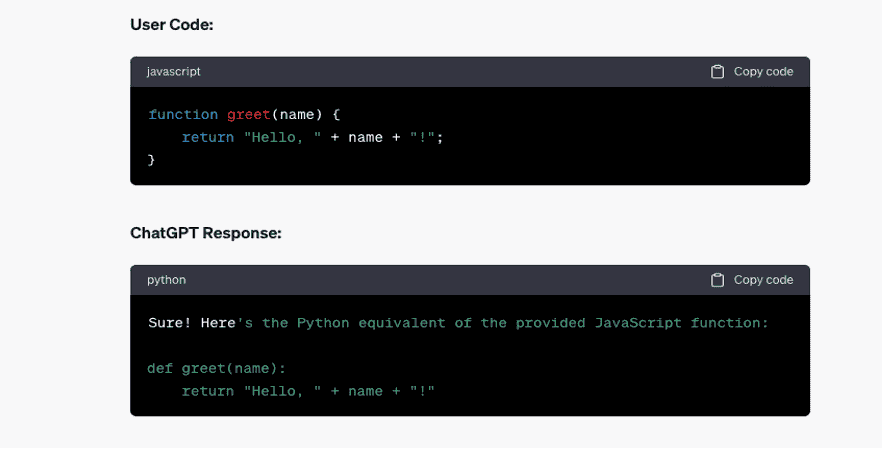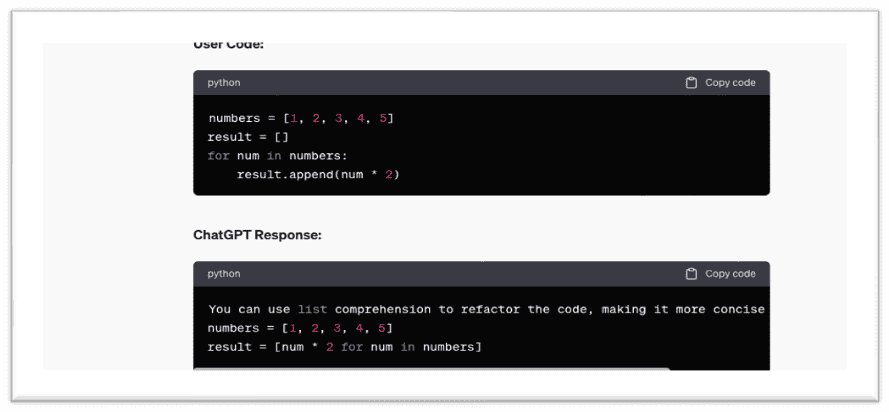|
Getting your Trinity Audio player ready...
|
As a programmer, finding ways to enhance productivity is crucial for optimizing your workflow and achieving efficient results. One effective technique is leveraging ChatGPT prompts, which can provide you with inspiration, guidance, and problem-solving assistance. In this article, we will explore ten ChatGPT prompts specifically tailored to boost productivity for programmers. By incorporating these prompts into your daily routine, you can overcome challenges, stimulate your creativity, and enhance your overall programming experience.
Leveraging ChatGPT Prompts for Productivity:
In today’s fast-paced programming landscape, leveraging artificial intelligence tools such as ChatGPT prompts can significantly enhance your productivity. ChatGPT is a language model designed to assist you in various aspects of programming, offering suggestions, explanations, and problem-solving assistance. By incorporating ChatGPT prompts into your daily routine, you can streamline your coding process, overcome challenges, and discover innovative solutions.
7 Benefits of Using ChatGPT for Programmers:
1. Instant Code Assistance-
ChatGPT serves as an instant coding companion, providing programmers with quick answers to syntax-related questions. Whether it’s the correct syntax for a language or a specific library, programmers can rely on ChatGPT for accurate and on-the-spot assistance.
2. Debugging Support-
Debugging code can be challenging and time-consuming. ChatGPT can help programmers identify potential bugs and suggest possible solutions, saving valuable debugging time and efforts.
3. Algorithmic Optimization-
Optimizing algorithms is crucial for efficient code execution. Programmers can seek ChatGPT’s advice on algorithmic improvements, enabling them to enhance the performance of their code.
4. Code Generation-
ChatGPT can generate code snippets based on specific requirements, helping programmers expedite their development process. Whether it’s creating a function or a complex data structure, ChatGPT can provide ready-to-use code, reducing manual coding efforts.
5. Language Translation-
For programmers working with multilingual codebases, ChatGPT can assist in translating code between different programming languages. This feature facilitates code reuse and collaboration among developers using diverse languages.
6. Code Refactoring Assistance-
Refactoring code is essential for maintaining code quality and readability. ChatGPT can suggest ways to refactor complex code snippets, helping programmers write cleaner and more maintainable code.
7. Integration with Frameworks and APIs-
ChatGPT can provide guidance on integrating various frameworks and APIs effectively. Whether it’s interacting with web APIs, databases, or third-party libraries, programmers can rely on ChatGPT’s advice for smooth integration.
10 Best ChatGPT Prompts for Programmers:
Prompt 1: Explain how the map function works in JavaScript
In JavaScript, the map() function is a higher-order array method that operates on an array and allows you to transform each element of the array into a new value. It creates a new array containing the results of applying a provided function to each element of the original array without modifying the original array.
The map() function takes in a callback function as an argument. This callback function is executed once for each element in the array, and its return value becomes the corresponding element in the new array. The original array remains unchanged.
Here’s the syntax of the map() function:
Parameters:
array: The original array on which you want to apply the map() function.
callback: A function that is called for each element in the array. It can take three parameters:
currentValue: The current element being processed in the array.
index (Optional): The index of the current element being processed.
array (Optional): The original array being processed.
The map() function iterates over each element of the array and applies the callback function to each element, passing the element, index (optional), and the original array (optional) as arguments. The return value of the callback function is collected in a new array, which is then returned by the map() function.
Here’s an example of how the map() function works:
- In Example 1, each element of the numbers array is doubled, and the resulting array doubledNumbers contains the doubled values.
- In Example 2, the squaredNumbers array is created by squaring each element of the original numbers array.
- In Example 3, the indexedNumbers array is obtained by multiplying each element of the numbers array with its corresponding index incremented by 1.
Prompt 2: Optimize the Code
Optimize following Python code: def square(numbers): result = [] for number in numbers: result.append(number * number) return result
To optimize the given Python code, we can use list comprehension, which is a more concise and efficient way to create lists in Python. List comprehension can significantly improve the performance of your code and make it more readable. Here’s the optimized version of the code:
Prompt 3: Generate a sample JSON of 2 products for a clothing e-commerce site
Prompt 4: Code Syntax Help
One of the most common struggles programmers face is getting the correct syntax for a particular language or library. ChatGPT can serve as an instant reference by providing accurate syntax information on-demand. For example:
User Prompt: “How to declare and initialize a list in Python?”
Prompt 5: Debugging Assistance
Debugging code can be a tedious and time-consuming process. ChatGPT can help identify potential issues and suggest solutions. For instance:
User Prompt: “My Python code is giving an ‘IndexError: list index out of range.’ Can you help me find the problem?”
Prompt 6: Algorithmic Optimization
Optimizing algorithms is crucial for efficient code execution. Programmers can seek ChatGPT’s advice on optimizing their algorithms for better performance. For example:
User Prompt: “I have a list of integers. How can I find the maximum value efficiently in Python?”
Prompt 7: Code Generation
ChatGPT can generate code snippets based on specific requirements, saving time and effort for programmers. For example:
User Prompt: “Write a Python function to check if a string is a palindrome.
Prompt 8: Language Translation
For programmers working with multilingual codebases, ChatGPT can assist in translating code between programming languages. For instance:
User Prompt: “Translate this JavaScript function into Python:”
Prompt 9: Code Refactoring
Refactoring code improves its readability and maintainability. ChatGPT can suggest ways to refactor complex code snippets. For example:
User Prompt: “How can I refactor this Python code to be more efficient?”
Prompt 10: Integration with Frameworks and APIs
ChatGPT can assist programmers in integrating various frameworks and APIs effectively, providing guidance on their implementation. For example:
User Prompt: “How do I use the requests library in Python to make an API call?”
Conclusion
By incorporating ChatGPT prompts into your programming journey, you can unlock new levels of productivity and creativity. Whether you need assistance with debugging, code optimization, algorithm design, or project idea generation, ChatGPT can provide valuable insights and guidance.
Additionally, leveraging ChatGPT prompts for learning new programming languages, improving documentation, solving problems, designing interfaces, refactoring code, and enhancing collaboration can significantly boost your efficiency as a programmer. Embrace the power of AI and explore the endless possibilities that ChatGPT brings to the table.
FAQs
Can ChatGPT replace human programmers?
While ChatGPT is a powerful tool, it is not designed to replace human programmers. It serves as an assistant, providing guidance and suggestions to enhance productivity.
Is ChatGPT limited to specific programming languages?
No, ChatGPT can assist with a wide range of programming languages, making it a versatile tool for programmers regardless of their language preferences.
How can ChatGPT prompts improve code optimization?
ChatGPT prompts can offer suggestions and insights on improving code efficiency, such as algorithmic enhancements, memory optimization, and time complexity reduction.
Can ChatGPT prompts generate project ideas for specific domains?
Yes, by providing details about your interests and desired functionality, ChatGPT prompts can generate project














